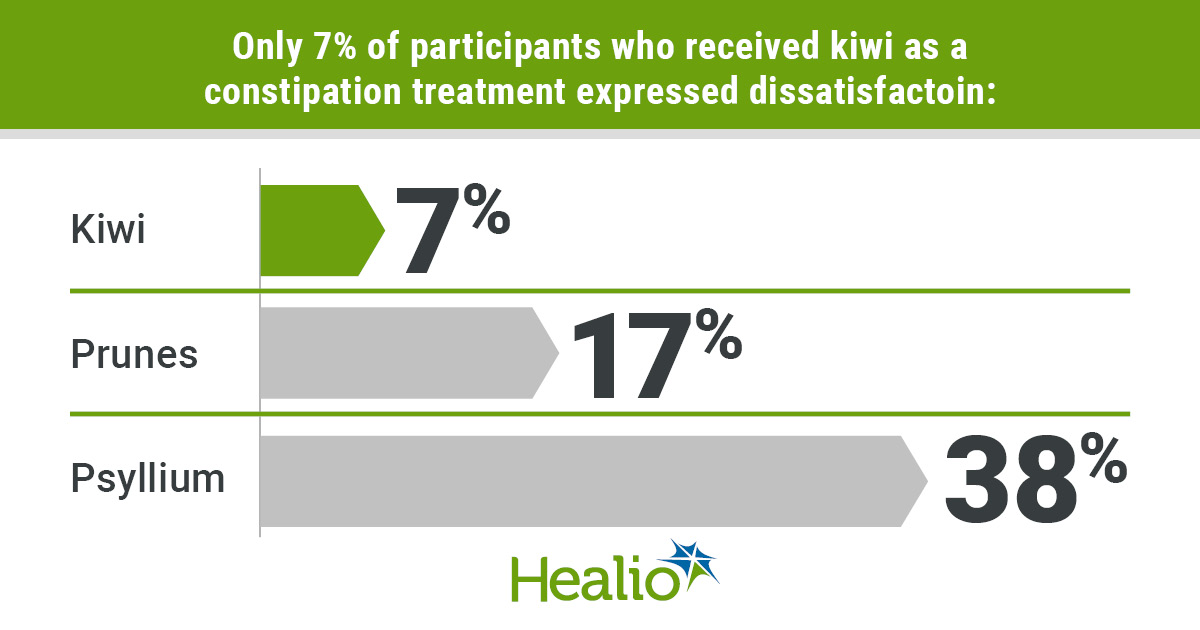Chey SW, et al. Abstract: S0454. Presented at the American College of Gastroenterology Annual Scientific Meeting (Virtual). Oct. 23-28, 2020.
Chey SW, et al. Abstract: S0454. Presented at the American College of Gastroenterology Annual Scientific Meeting (Virtual). Oct. 23-28, 2020.
Two peeled kiwi fruit per day improved chronic constipation while being better tolerated than other traditional natural remedies, according to a randomized study presented at ACG 2020 Virtual.
“While there are many therapeutic options available for chronic constipation, they only lead to about half of patients feeling better and only offer therapeutic gain of 10% to 15% over placebo showing the need for additional forms of therapy,” Samuel W. Chey, MPH, of University of Michigan, said during his virtual presentation. “Furthermore, consumer shifts in chronic medication, safety and preferences have drawn the public towards more natural solutions for chronic constipation.”
Though prunes and psyllium have been shown in U.S. studies to affect constipation, kiwi fruit has not been previously studied in the U.S. Because it is lower on the FODMAP scale, Chey and colleagues sought to compare it with the two more traditional natural remedies.
The researchers randomly assigned 79 patients with chronic constipation to receive one of three natural constipation treatments – prunes (12 peeled), psyllium (100 g) or green kiwi fruit (two peeled) – daily for 4 weeks.
All three treatments improved complete spontaneous bowel movement (P .003). Prunes demonstrated the largest magnitude of response at 67% vs. 64% for psyllium vs. 45% for Kiwi fruit, Chey said.
Stool consistency improved with kiwi (P = .01) and prunes (P = .049) and straining significantly improved with kiwi (P = .003), prunes (P < .001) and psyllium (P = .04). Adverse events were most common with psyllium and least common with kiwi. At the end of treatment, a smaller proportion of patients were dissatisfied with kiwi compared with prunes or psyllium (P = .02).
“The highest proportion of participants – 68% – reported treatment satisfaction with kiwifruit while similar proportions of those receiving prunes and psyllium – 48% – reported satisfaction,” Chey said. “The kiwi group had the lowest proportion of participants reporting treatment dissatisfaction at 7%. In fact, there was a statistically significantly lower likelihood of kiwifruit participants reporting treatment dissatisfaction compared to prunes or psyllium at 17% and 38%, respectively.”
Participants receiving prunes and psyllium were more likely to report abdominal pain and bloating than those receiving kiwi, Chey added. Of the participants who received kiwi, 0% reported abdominal pain or gas compared with 18% for both in the prunes group and 33% pain and 19% gas in the psyllium group.
“Prunes and psyllium are reconfirmed as effective options to treat chronic constipation with prunes demonstrating the strongest response for our primary outcome,” Chey said. “And for the first time in the North American population, kiwifruit was shown to be an effective well-tolerated and well-received natural treatment option for chronic constipation.”
Scott Gabbard, MD
This is an interesting study. Many patients would like to take a natural approach to their health and are interested in dietary management of conditions such as chronic constipation. My patients often ask what natural therapies we can provide for their chronic constipation and, in the past, I’ve certainly used psyllium and prunes. This study highlights the use of kiwi fruit. Interestingly, the fiber content for all the therapies studied was the same. If fiber were the only active ingredients, in theory, each therapy should have similar efficacy. However, kiwi fruit was greatly superior in terms of patient satisfaction and decrease in symptoms. The authors point out that kiwi contains an enzyme, a protease called actinidin, that may be partially responsible for the benefits of kiwi fruit for chronic constipation.
I was impressed with the high patient satisfaction and low dissatisfaction of kiwi fruit compared to psyllium and prunes. After reading this study, I looked at the calorie content of prunes, and noted that 12 prunes have about 275 calories, 64 g of carbohydrates and 38 g of sugar. In comparison, one kiwi twice a day has 80 calories, 20 g of carbohydrates and only 12 g of sugar. Calories and sugar intake are important to everyone, especially to our older patients and patients who have diabetes. In my practice, I am now making kiwi fruit my go to recommendation for my patients with chronic constipation who want to take a natural approach to their symptoms.
There was a lower adverse event with kiwi compared with prunes and psyllium. Patients with constipation generally aren’t coming to my office complaining about their frequency of complete spontaneous bowel movements, which is often the endpoint of a study. My patients are complaining about pain, discomfort and bloating and kiwi fruit had the lowest rate of pain, discomfort and bloating and gas, compared with prunes or psyllium. Kiwi decreased the symptoms that matter most to my patients.
Get the latest news and education delivered to your inbox
© 2022 Healio All Rights Reserved.
Get the latest news and education delivered to your inbox
© 2022 Healio All Rights Reserved.
